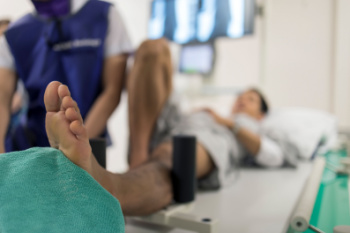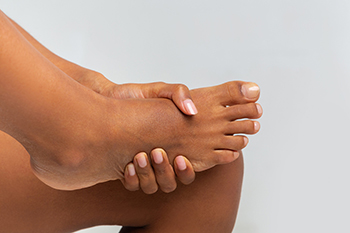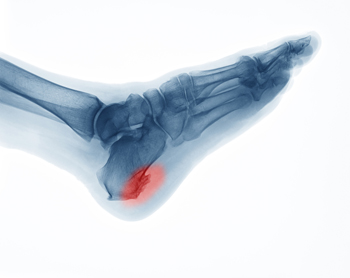 A hairline fracture, or stress fracture, is a small crack or severe bruise within a bone that is common among athletes that are involved in running and jumping. People with osteoporosis are also more prone to developing hairline fractures. These injuries typically result from overuse or repetitive stress, often worsened by inadequate healing time between activities. The bones in the foot are particularly susceptible to stress fractures due to their role in absorbing impact during physical activities. Within the foot, the second and third metatarsals are frequently affected, as well as the heel, ankle bones, and navicular bone. Symptoms primarily include pain that worsens with activity and subsides with rest, swelling, tenderness, and bruising. Factors that can increase the risk of developing a stress fracture include participation in high-impact sports, certain foot structures, and weakened bones due to conditions like osteoporosis. Previous fractures, nutritional deficiencies, and improper equipment or techniques are other risk factors. Diagnosing a stress fracture often involves a physical exam and may require imaging tests like MRIs or bone scans, as X-rays might not detect fractures. If ignored, a stress fracture can worsen into a complete break. If you are experiencing foot pain during exercise, it is suggested that you schedule an appointment with a podiatrist for an exam, diagnosis, and treatment options.
A hairline fracture, or stress fracture, is a small crack or severe bruise within a bone that is common among athletes that are involved in running and jumping. People with osteoporosis are also more prone to developing hairline fractures. These injuries typically result from overuse or repetitive stress, often worsened by inadequate healing time between activities. The bones in the foot are particularly susceptible to stress fractures due to their role in absorbing impact during physical activities. Within the foot, the second and third metatarsals are frequently affected, as well as the heel, ankle bones, and navicular bone. Symptoms primarily include pain that worsens with activity and subsides with rest, swelling, tenderness, and bruising. Factors that can increase the risk of developing a stress fracture include participation in high-impact sports, certain foot structures, and weakened bones due to conditions like osteoporosis. Previous fractures, nutritional deficiencies, and improper equipment or techniques are other risk factors. Diagnosing a stress fracture often involves a physical exam and may require imaging tests like MRIs or bone scans, as X-rays might not detect fractures. If ignored, a stress fracture can worsen into a complete break. If you are experiencing foot pain during exercise, it is suggested that you schedule an appointment with a podiatrist for an exam, diagnosis, and treatment options.
Activities where too much pressure is put on the feet can cause stress fractures. To learn more, contact Dr. Robert Graser from Graser Podiatry and Bunion Surgery Institute. Our doctor can provide the care you need to keep your pain free and on your feet.
Dealing with Stress Fractures of the Foot and Ankle
Stress fractures occur in the foot and ankle when muscles in these areas weaken from too much or too little use. The feet and ankles then lose support when walking or running from the impact of the ground. Since there is no protection, the bones receive the full impact of each step. Stress on the feet can cause cracks to form in the bones, thus creating stress fractures.
What Are Stress Fractures?
Stress fractures occur frequently in individuals whose daily activities cause great impact on the feet and ankles. Stress factors are most common among:
- Runners
- People affected with Osteoporosis
- Tennis or basketball players
- Gymnasts
- High impact workouts
Symptoms
Pain from the fractures occur in the area of the fractures and can be constant or intermittent. It will often cause sharp or dull pain with swelling and tenderness. Engaging in any kind of activity which involves high impact will aggravate pain.
If you have any questions please feel free to contact our office located in Boerne, . We offer the newest diagnostic and treatment technologies for all your foot and ankle needs.

Multiple sclerosis, or MS, can significantly impact foot health due to its effects on the nervous system, leading to various symptoms. Common foot issues can include numbness or tingling, muscle weakness, and difficulty with balance and coordination. These symptoms can contribute to challenges in walking, increased risk of falls, and potential development of foot deformities like claw toes or foot drop. Managing MS-related foot issues involves a multidisciplinary approach, with visiting a podiatrist as an essential part. Podiatrists can assess foot function, and recommend appropriate footwear to improve stability and reduce pressure points. Regular podiatric care helps individuals with MS maintain optimal foot health, minimizing discomfort and improving mobility. If you have multiple sclerosis, it is suggested you visit a podiatrist who can help you manage this condition as it affects your feet.
Some foot conditions may require additional professional care. If you have any concerns, contact Dr. Robert Graser of Graser Podiatry and Bunion Surgery Institute. Our doctor can provide the care you need to keep you pain-free and on your feet.
Rare Foot Conditions
The majority of foot conditions are common and can be treated by a podiatrist. Standard diagnostic procedures are generally used to identify specific conditions and treatment can be rendered. A podiatrist also treats rare foot conditions which can be difficult to diagnose and may need extra attention and care.
There are many rare foot conditions that can affect children. Some of these can include:
- Freiberg’s disease
- Kohler’s disease
- Maffucci syndrome
Freiberg’s disease - This can be seen as a deterioration and flattening of a metatarsal bone that exists in the ball of the foot. It typically affects pre-teen and teenage girls, but can affect anyone at any age. Symptoms that can accompany this can be swelling, stiffness, and the patient may limp.
Kohler’s disease - This often targets the bone in the arch of the foot and affects younger boys. It can lead to an interruption of the blood supply which ultimately can lead to bone deterioration. The patient may limp or experience tenderness, swelling, and redness.
Maffucci syndrome - This affects the long bones in a child’s foot leading to the development of abnormal bone lesions. They are benign growths and typically develop in early childhood and the bones may be susceptible to breaking.
A podiatrist can properly diagnose and treat all types of rare foot conditions. If your child is affected by any of these symptoms or conditions, please don’t hesitate to call our office so the correct treatment method can begin.
If you have any questions please feel free to contact our office located in Boerne, . We offer the newest diagnostic tools and technology to treat your foot and ankle needs.
 A heel spur, medically known as a calcaneal spur, is a bony growth that develops on the underside of the heel bone. This condition often results from long-term strain on the foot muscles and ligaments, commonly associated with repetitive activities such as running or jumping. Over time, this strain leads to the accumulation of calcium deposits, forming the bony protrusion. Heel spurs are frequently linked to plantar fasciitis, an inflammation of the plantar fascia tissue that runs along the bottom of the foot. Factors contributing to heel spur development include wearing ill-fitting shoes, excessive weight, and having flat feet or high arches. If you have heel pain, it may be indicative of a heel spur, and it is suggested that you consult a podiatrist who can accurately diagnose and offer a comprehensive treatment plan for heel spurs.
A heel spur, medically known as a calcaneal spur, is a bony growth that develops on the underside of the heel bone. This condition often results from long-term strain on the foot muscles and ligaments, commonly associated with repetitive activities such as running or jumping. Over time, this strain leads to the accumulation of calcium deposits, forming the bony protrusion. Heel spurs are frequently linked to plantar fasciitis, an inflammation of the plantar fascia tissue that runs along the bottom of the foot. Factors contributing to heel spur development include wearing ill-fitting shoes, excessive weight, and having flat feet or high arches. If you have heel pain, it may be indicative of a heel spur, and it is suggested that you consult a podiatrist who can accurately diagnose and offer a comprehensive treatment plan for heel spurs.
Heel spurs can be incredibly painful and sometimes may make you unable to participate in physical activities. To get medical care for your heel spurs, contact Dr. Robert Graser from Graser Podiatry and Bunion Surgery Institute. Our doctor will do everything possible to treat your condition.
Heels Spurs
Heel spurs are formed by calcium deposits on the back of the foot where the heel is. This can also be caused by small fragments of bone breaking off one section of the foot, attaching onto the back of the foot. Heel spurs can also be bone growth on the back of the foot and may grow in the direction of the arch of the foot.
Older individuals usually suffer from heel spurs and pain sometimes intensifies with age. One of the main condition's spurs are related to is plantar fasciitis.
Pain
The pain associated with spurs is often because of weight placed on the feet. When someone is walking, their entire weight is concentrated on the feet. Bone spurs then have the tendency to affect other bones and tissues around the foot. As the pain continues, the feet will become tender and sensitive over time.
Treatments
There are many ways to treat heel spurs. If one is suffering from heel spurs in conjunction with pain, there are several methods for healing. Medication, surgery, and herbal care are some options.
If you have any questions feel free to contact our office located in Boerne, . We offer the latest in diagnostic and treatment technology to meet your needs.
Blog Archives
- July 2024
- June 2024
- May 2024
- April 2024
- March 2024
- February 2024
- January 2024
- December 2023
- November 2023
- October 2023
- September 2023
- August 2023
- July 2023
- June 2023
- May 2023
- April 2023
- March 2023
- February 2023
- January 2023
- December 2022
- November 2022
- October 2022
- September 2022
- August 2022
- July 2022
- June 2022
- May 2022
- April 2022
- March 2022
- February 2022
- January 2022
- December 2021
- November 2021
- October 2021
- September 2021
- August 2021
- July 2021
- June 2021
- May 2021
- April 2021
- March 2021
- February 2021
- January 2021
- December 2020
- November 2020
- October 2020
- September 2020
- August 2020
- July 2020
- June 2020
- May 2020
- April 2020
- March 2020
- February 2020
- January 2020
- December 2019
- November 2019
- October 2019
- September 2019
- August 2019
- July 2019
- June 2019
- May 2019
- April 2019
- March 2019
- February 2019
- January 2019
- December 2018
- November 2018
- October 2018
- September 2018
- August 2018
- July 2018
- June 2018
- May 2018









